Emirates College Research: Self-Assessment in UAE Primary Schools
VerifiedAdded on 2021/06/17
|42
|11628
|28
Project
AI Summary
This research project, submitted to the Emirates College for Advanced Education, investigates teachers' use of self-assessment strategies to enhance student self-awareness in primary public schools in the UAE. The study, based on qualitative interviews with experienced teachers, explores the benefits of self-assessment for young learners and identifies ways to improve its practical application. The research delves into the challenges and importance of self-assessment, as well as the strategies employed to help students understand their capabilities and evaluate their learning approaches. The project also provides a comprehensive literature review, detailing the theory and studies related to self-awareness and self-assessment, along with the research methodology, data analysis, and ethical considerations. The findings highlight the positive impact of self-assessment on student development and offer insights into the evolving educational landscape of the UAE.
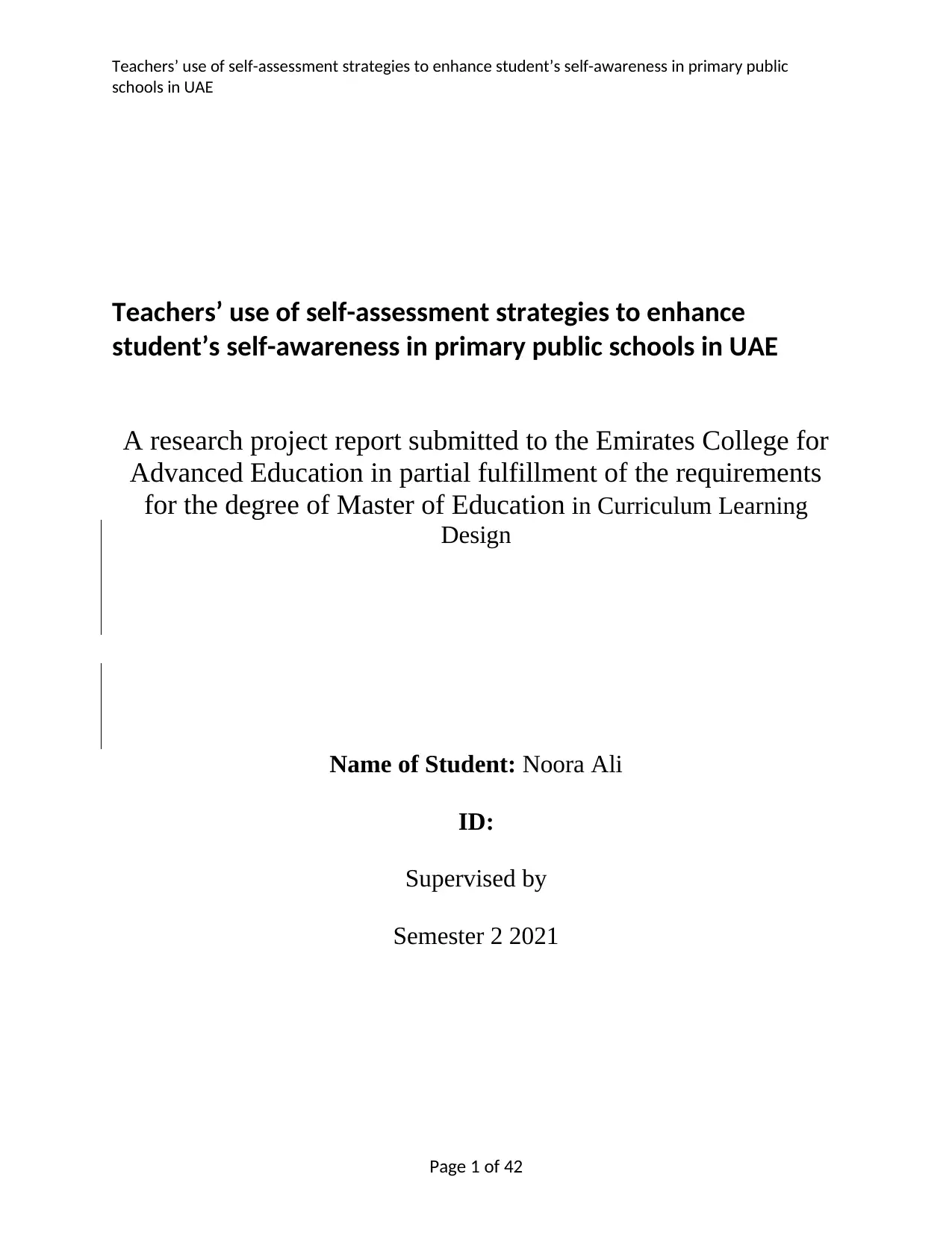
Teachers’ use of self-assessment strategies to enhance student’s self-awareness in primary public
schools in UAE
Teachers’ use of self-assessment strategies to enhance
student’s self-awareness in primary public schools in UAE
A research project report submitted to the Emirates College for
Advanced Education in partial fulfillment of the requirements
for the degree of Master of Education in Curriculum Learning
Design
Name of Student: Noora Ali
ID:
Supervised by
Semester 2 2021
Page 1 of 42
schools in UAE
Teachers’ use of self-assessment strategies to enhance
student’s self-awareness in primary public schools in UAE
A research project report submitted to the Emirates College for
Advanced Education in partial fulfillment of the requirements
for the degree of Master of Education in Curriculum Learning
Design
Name of Student: Noora Ali
ID:
Supervised by
Semester 2 2021
Page 1 of 42
Paraphrase This Document
Need a fresh take? Get an instant paraphrase of this document with our AI Paraphraser
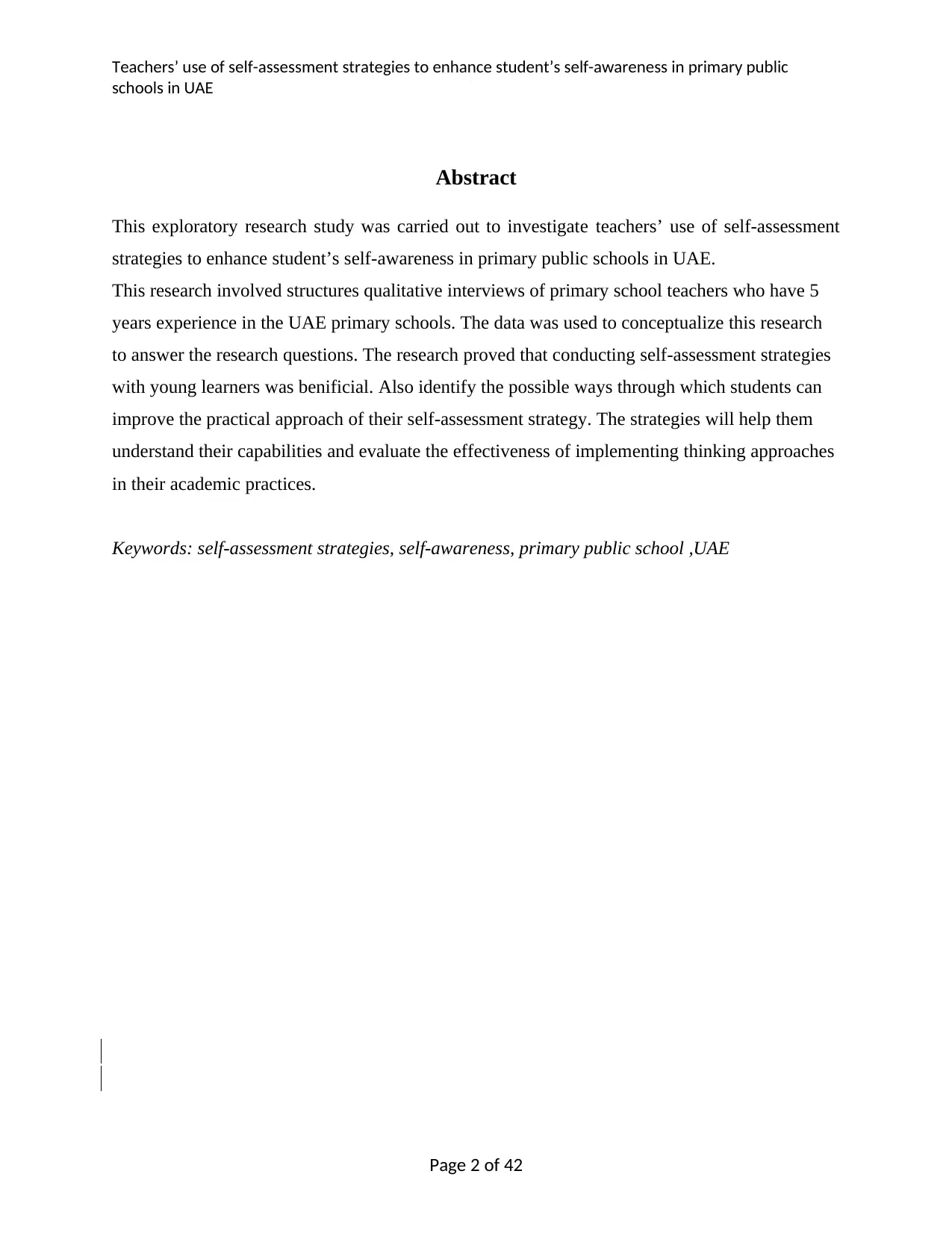
Teachers’ use of self-assessment strategies to enhance student’s self-awareness in primary public
schools in UAE
Abstract
This exploratory research study was carried out to investigate teachers’ use of self-assessment
strategies to enhance student’s self-awareness in primary public schools in UAE.
This research involved structures qualitative interviews of primary school teachers who have 5
years experience in the UAE primary schools. The data was used to conceptualize this research
to answer the research questions. The research proved that conducting self-assessment strategies
with young learners was benificial. Also identify the possible ways through which students can
improve the practical approach of their self-assessment strategy. The strategies will help them
understand their capabilities and evaluate the effectiveness of implementing thinking approaches
in their academic practices.
Keywords: self-assessment strategies, self-awareness, primary public school ,UAE
Page 2 of 42
schools in UAE
Abstract
This exploratory research study was carried out to investigate teachers’ use of self-assessment
strategies to enhance student’s self-awareness in primary public schools in UAE.
This research involved structures qualitative interviews of primary school teachers who have 5
years experience in the UAE primary schools. The data was used to conceptualize this research
to answer the research questions. The research proved that conducting self-assessment strategies
with young learners was benificial. Also identify the possible ways through which students can
improve the practical approach of their self-assessment strategy. The strategies will help them
understand their capabilities and evaluate the effectiveness of implementing thinking approaches
in their academic practices.
Keywords: self-assessment strategies, self-awareness, primary public school ,UAE
Page 2 of 42
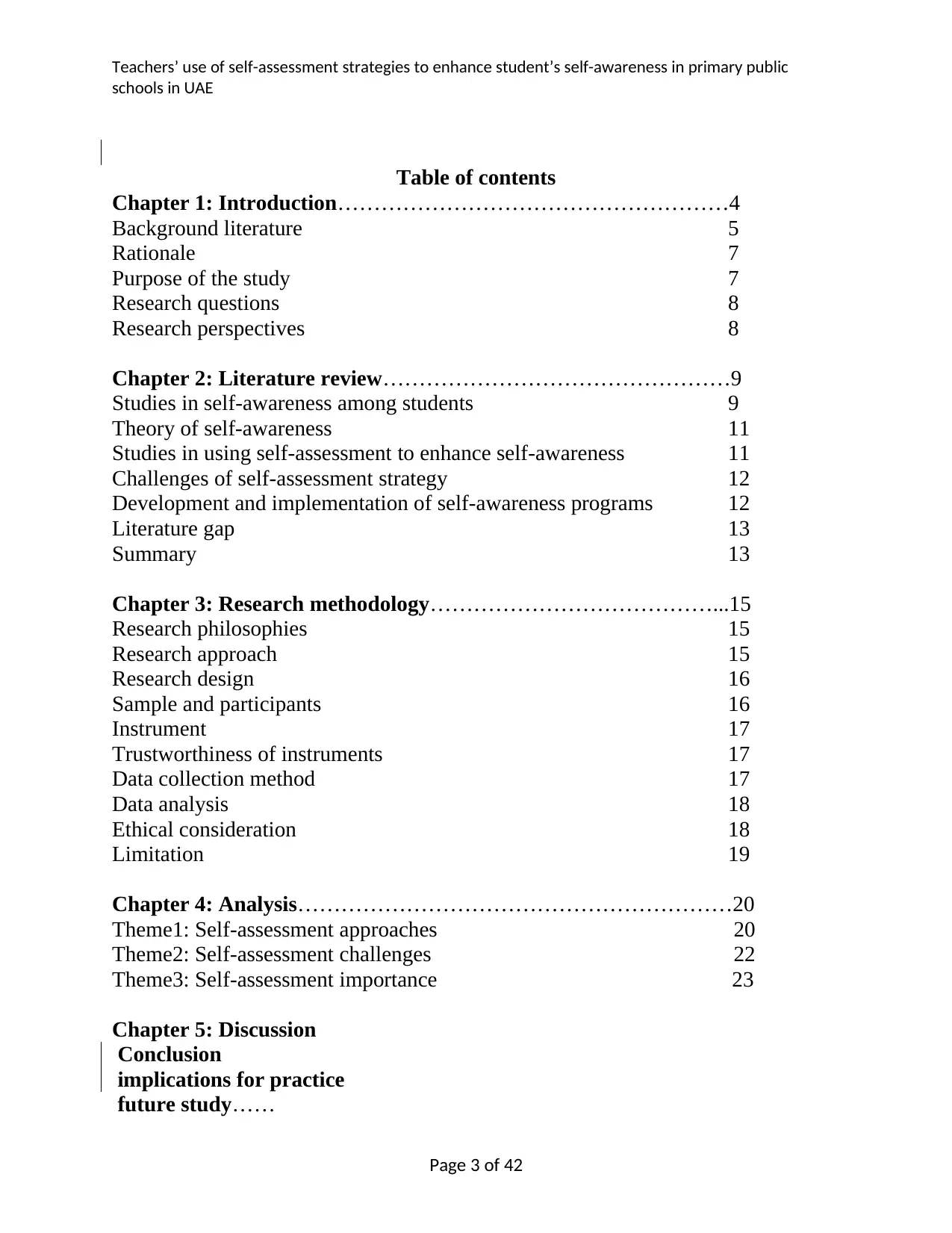
Teachers’ use of self-assessment strategies to enhance student’s self-awareness in primary public
schools in UAE
Table of contents
Chapter 1: Introduction………………………………………………4
Background literature 5
Rationale 7
Purpose of the study 7
Research questions 8
Research perspectives 8
Chapter 2: Literature review…………………………………………9
Studies in self-awareness among students 9
Theory of self-awareness 11
Studies in using self-assessment to enhance self-awareness 11
Challenges of self-assessment strategy 12
Development and implementation of self-awareness programs 12
Literature gap 13
Summary 13
Chapter 3: Research methodology…………………………………...15
Research philosophies 15
Research approach 15
Research design 16
Sample and participants 16
Instrument 17
Trustworthiness of instruments 17
Data collection method 17
Data analysis 18
Ethical consideration 18
Limitation 19
Chapter 4: Analysis……………………………………………………20
Theme1: Self-assessment approaches 20
Theme2: Self-assessment challenges 22
Theme3: Self-assessment importance 23
Chapter 5: Discussion
Conclusion
implications for practice
future study……
Page 3 of 42
schools in UAE
Table of contents
Chapter 1: Introduction………………………………………………4
Background literature 5
Rationale 7
Purpose of the study 7
Research questions 8
Research perspectives 8
Chapter 2: Literature review…………………………………………9
Studies in self-awareness among students 9
Theory of self-awareness 11
Studies in using self-assessment to enhance self-awareness 11
Challenges of self-assessment strategy 12
Development and implementation of self-awareness programs 12
Literature gap 13
Summary 13
Chapter 3: Research methodology…………………………………...15
Research philosophies 15
Research approach 15
Research design 16
Sample and participants 16
Instrument 17
Trustworthiness of instruments 17
Data collection method 17
Data analysis 18
Ethical consideration 18
Limitation 19
Chapter 4: Analysis……………………………………………………20
Theme1: Self-assessment approaches 20
Theme2: Self-assessment challenges 22
Theme3: Self-assessment importance 23
Chapter 5: Discussion
Conclusion
implications for practice
future study……
Page 3 of 42
⊘ This is a preview!⊘
Do you want full access?
Subscribe today to unlock all pages.

Trusted by 1+ million students worldwide
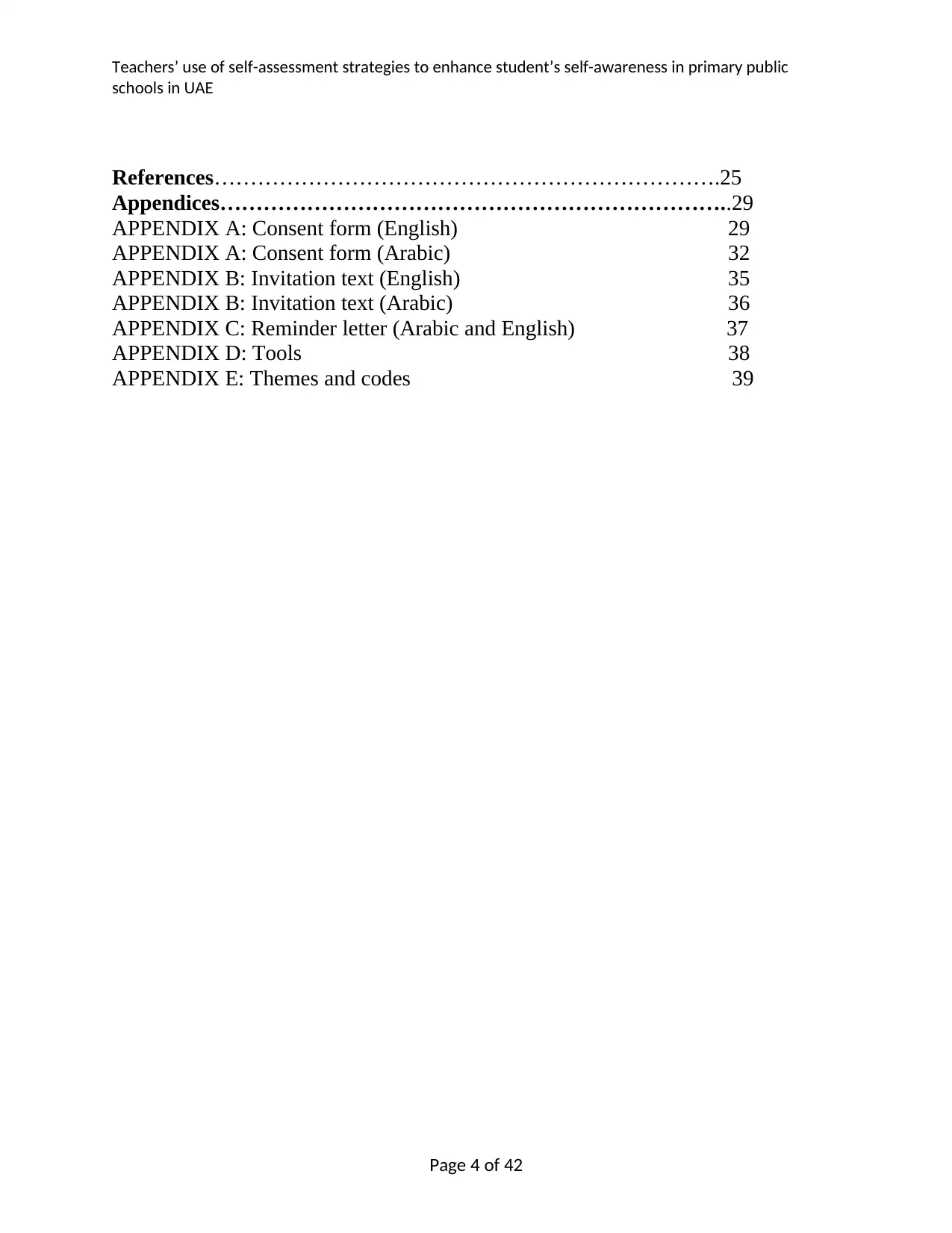
Teachers’ use of self-assessment strategies to enhance student’s self-awareness in primary public
schools in UAE
References…………………………………………………………….25
Appendices……………………………………………………………..29
APPENDIX A: Consent form (English) 29
APPENDIX A: Consent form (Arabic) 32
APPENDIX B: Invitation text (English) 35
APPENDIX B: Invitation text (Arabic) 36
APPENDIX C: Reminder letter (Arabic and English) 37
APPENDIX D: Tools 38
APPENDIX E: Themes and codes 39
Page 4 of 42
schools in UAE
References…………………………………………………………….25
Appendices……………………………………………………………..29
APPENDIX A: Consent form (English) 29
APPENDIX A: Consent form (Arabic) 32
APPENDIX B: Invitation text (English) 35
APPENDIX B: Invitation text (Arabic) 36
APPENDIX C: Reminder letter (Arabic and English) 37
APPENDIX D: Tools 38
APPENDIX E: Themes and codes 39
Page 4 of 42
Paraphrase This Document
Need a fresh take? Get an instant paraphrase of this document with our AI Paraphraser
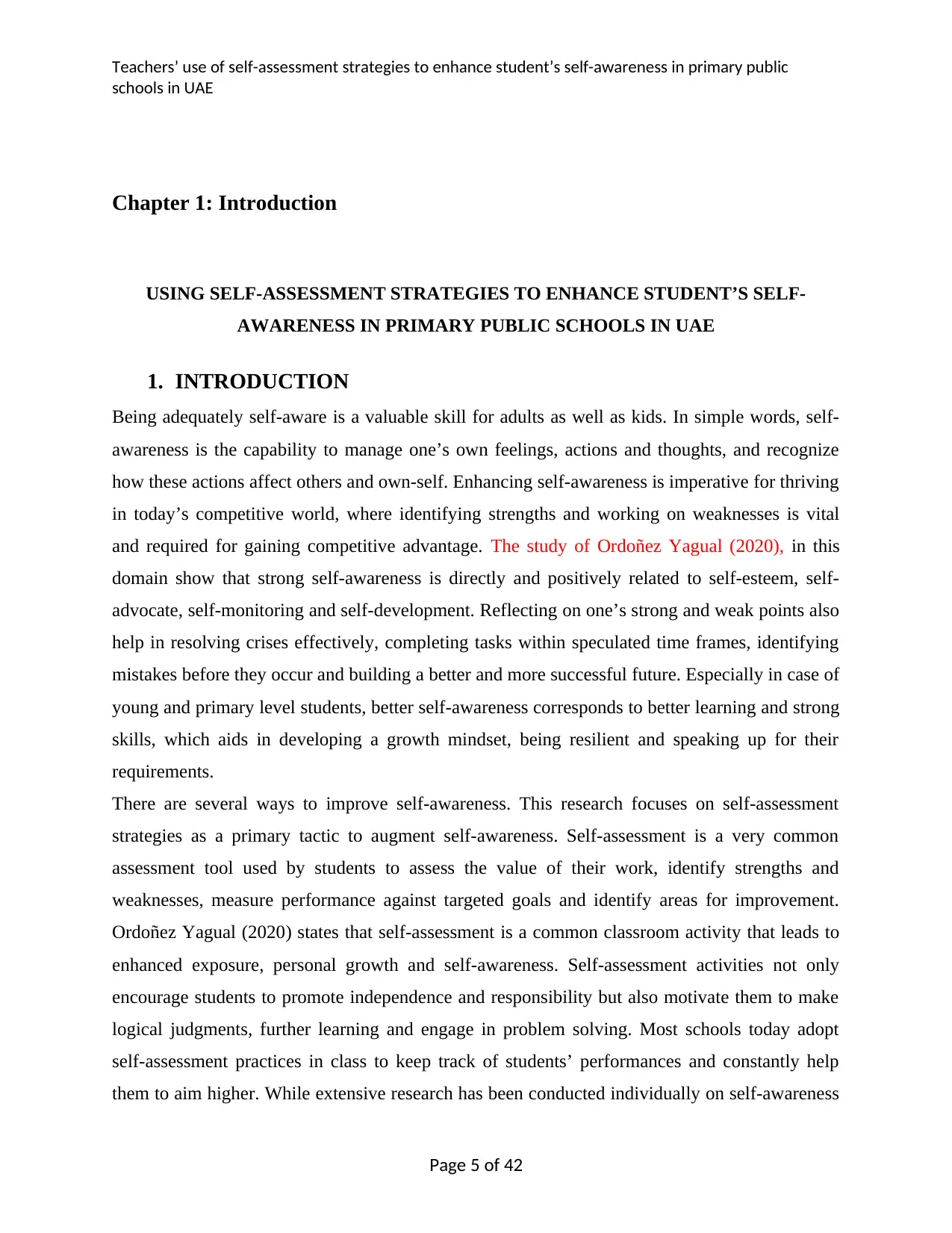
Teachers’ use of self-assessment strategies to enhance student’s self-awareness in primary public
schools in UAE
Chapter 1: Introduction
USING SELF-ASSESSMENT STRATEGIES TO ENHANCE STUDENT’S SELF-
AWARENESS IN PRIMARY PUBLIC SCHOOLS IN UAE
1. INTRODUCTION
Being adequately self-aware is a valuable skill for adults as well as kids. In simple words, self-
awareness is the capability to manage one’s own feelings, actions and thoughts, and recognize
how these actions affect others and own-self. Enhancing self-awareness is imperative for thriving
in today’s competitive world, where identifying strengths and working on weaknesses is vital
and required for gaining competitive advantage. The study of Ordoñez Yagual (2020), in this
domain show that strong self-awareness is directly and positively related to self-esteem, self-
advocate, self-monitoring and self-development. Reflecting on one’s strong and weak points also
help in resolving crises effectively, completing tasks within speculated time frames, identifying
mistakes before they occur and building a better and more successful future. Especially in case of
young and primary level students, better self-awareness corresponds to better learning and strong
skills, which aids in developing a growth mindset, being resilient and speaking up for their
requirements.
There are several ways to improve self-awareness. This research focuses on self-assessment
strategies as a primary tactic to augment self-awareness. Self-assessment is a very common
assessment tool used by students to assess the value of their work, identify strengths and
weaknesses, measure performance against targeted goals and identify areas for improvement.
Ordoñez Yagual (2020) states that self-assessment is a common classroom activity that leads to
enhanced exposure, personal growth and self-awareness. Self-assessment activities not only
encourage students to promote independence and responsibility but also motivate them to make
logical judgments, further learning and engage in problem solving. Most schools today adopt
self-assessment practices in class to keep track of students’ performances and constantly help
them to aim higher. While extensive research has been conducted individually on self-awareness
Page 5 of 42
schools in UAE
Chapter 1: Introduction
USING SELF-ASSESSMENT STRATEGIES TO ENHANCE STUDENT’S SELF-
AWARENESS IN PRIMARY PUBLIC SCHOOLS IN UAE
1. INTRODUCTION
Being adequately self-aware is a valuable skill for adults as well as kids. In simple words, self-
awareness is the capability to manage one’s own feelings, actions and thoughts, and recognize
how these actions affect others and own-self. Enhancing self-awareness is imperative for thriving
in today’s competitive world, where identifying strengths and working on weaknesses is vital
and required for gaining competitive advantage. The study of Ordoñez Yagual (2020), in this
domain show that strong self-awareness is directly and positively related to self-esteem, self-
advocate, self-monitoring and self-development. Reflecting on one’s strong and weak points also
help in resolving crises effectively, completing tasks within speculated time frames, identifying
mistakes before they occur and building a better and more successful future. Especially in case of
young and primary level students, better self-awareness corresponds to better learning and strong
skills, which aids in developing a growth mindset, being resilient and speaking up for their
requirements.
There are several ways to improve self-awareness. This research focuses on self-assessment
strategies as a primary tactic to augment self-awareness. Self-assessment is a very common
assessment tool used by students to assess the value of their work, identify strengths and
weaknesses, measure performance against targeted goals and identify areas for improvement.
Ordoñez Yagual (2020) states that self-assessment is a common classroom activity that leads to
enhanced exposure, personal growth and self-awareness. Self-assessment activities not only
encourage students to promote independence and responsibility but also motivate them to make
logical judgments, further learning and engage in problem solving. Most schools today adopt
self-assessment practices in class to keep track of students’ performances and constantly help
them to aim higher. While extensive research has been conducted individually on self-awareness
Page 5 of 42
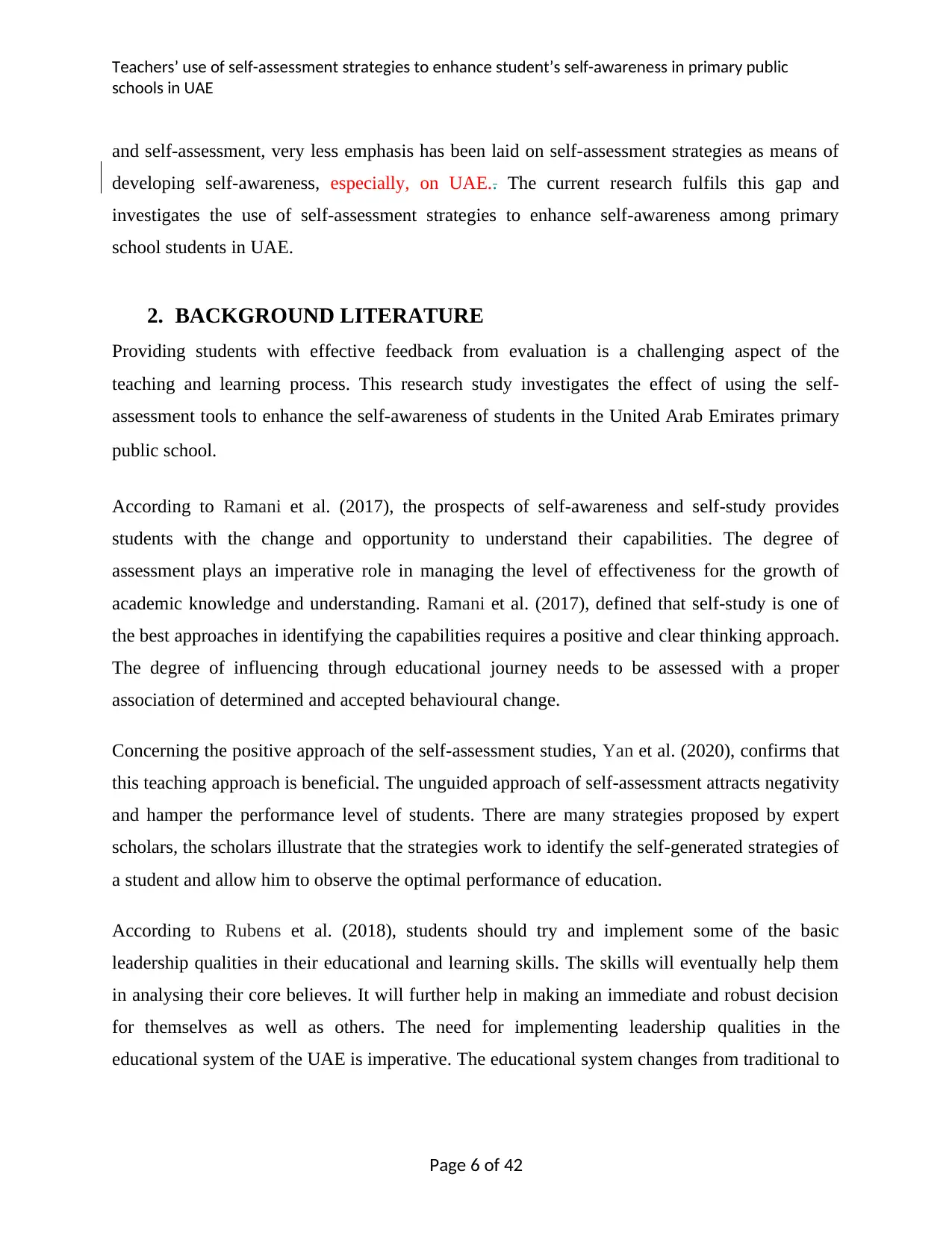
Teachers’ use of self-assessment strategies to enhance student’s self-awareness in primary public
schools in UAE
and self-assessment, very less emphasis has been laid on self-assessment strategies as means of
developing self-awareness, especially, on UAE.. The current research fulfils this gap and
investigates the use of self-assessment strategies to enhance self-awareness among primary
school students in UAE.
2. BACKGROUND LITERATURE
Providing students with effective feedback from evaluation is a challenging aspect of the
teaching and learning process. This research study investigates the effect of using the self-
assessment tools to enhance the self-awareness of students in the United Arab Emirates primary
public school.
According to Ramani et al. (2017), the prospects of self-awareness and self-study provides
students with the change and opportunity to understand their capabilities. The degree of
assessment plays an imperative role in managing the level of effectiveness for the growth of
academic knowledge and understanding. Ramani et al. (2017), defined that self-study is one of
the best approaches in identifying the capabilities requires a positive and clear thinking approach.
The degree of influencing through educational journey needs to be assessed with a proper
association of determined and accepted behavioural change.
Concerning the positive approach of the self-assessment studies, Yan et al. (2020), confirms that
this teaching approach is beneficial. The unguided approach of self-assessment attracts negativity
and hamper the performance level of students. There are many strategies proposed by expert
scholars, the scholars illustrate that the strategies work to identify the self-generated strategies of
a student and allow him to observe the optimal performance of education.
According to Rubens et al. (2018), students should try and implement some of the basic
leadership qualities in their educational and learning skills. The skills will eventually help them
in analysing their core believes. It will further help in making an immediate and robust decision
for themselves as well as others. The need for implementing leadership qualities in the
educational system of the UAE is imperative. The educational system changes from traditional to
Page 6 of 42
schools in UAE
and self-assessment, very less emphasis has been laid on self-assessment strategies as means of
developing self-awareness, especially, on UAE.. The current research fulfils this gap and
investigates the use of self-assessment strategies to enhance self-awareness among primary
school students in UAE.
2. BACKGROUND LITERATURE
Providing students with effective feedback from evaluation is a challenging aspect of the
teaching and learning process. This research study investigates the effect of using the self-
assessment tools to enhance the self-awareness of students in the United Arab Emirates primary
public school.
According to Ramani et al. (2017), the prospects of self-awareness and self-study provides
students with the change and opportunity to understand their capabilities. The degree of
assessment plays an imperative role in managing the level of effectiveness for the growth of
academic knowledge and understanding. Ramani et al. (2017), defined that self-study is one of
the best approaches in identifying the capabilities requires a positive and clear thinking approach.
The degree of influencing through educational journey needs to be assessed with a proper
association of determined and accepted behavioural change.
Concerning the positive approach of the self-assessment studies, Yan et al. (2020), confirms that
this teaching approach is beneficial. The unguided approach of self-assessment attracts negativity
and hamper the performance level of students. There are many strategies proposed by expert
scholars, the scholars illustrate that the strategies work to identify the self-generated strategies of
a student and allow him to observe the optimal performance of education.
According to Rubens et al. (2018), students should try and implement some of the basic
leadership qualities in their educational and learning skills. The skills will eventually help them
in analysing their core believes. It will further help in making an immediate and robust decision
for themselves as well as others. The need for implementing leadership qualities in the
educational system of the UAE is imperative. The educational system changes from traditional to
Page 6 of 42
⊘ This is a preview!⊘
Do you want full access?
Subscribe today to unlock all pages.

Trusted by 1+ million students worldwide
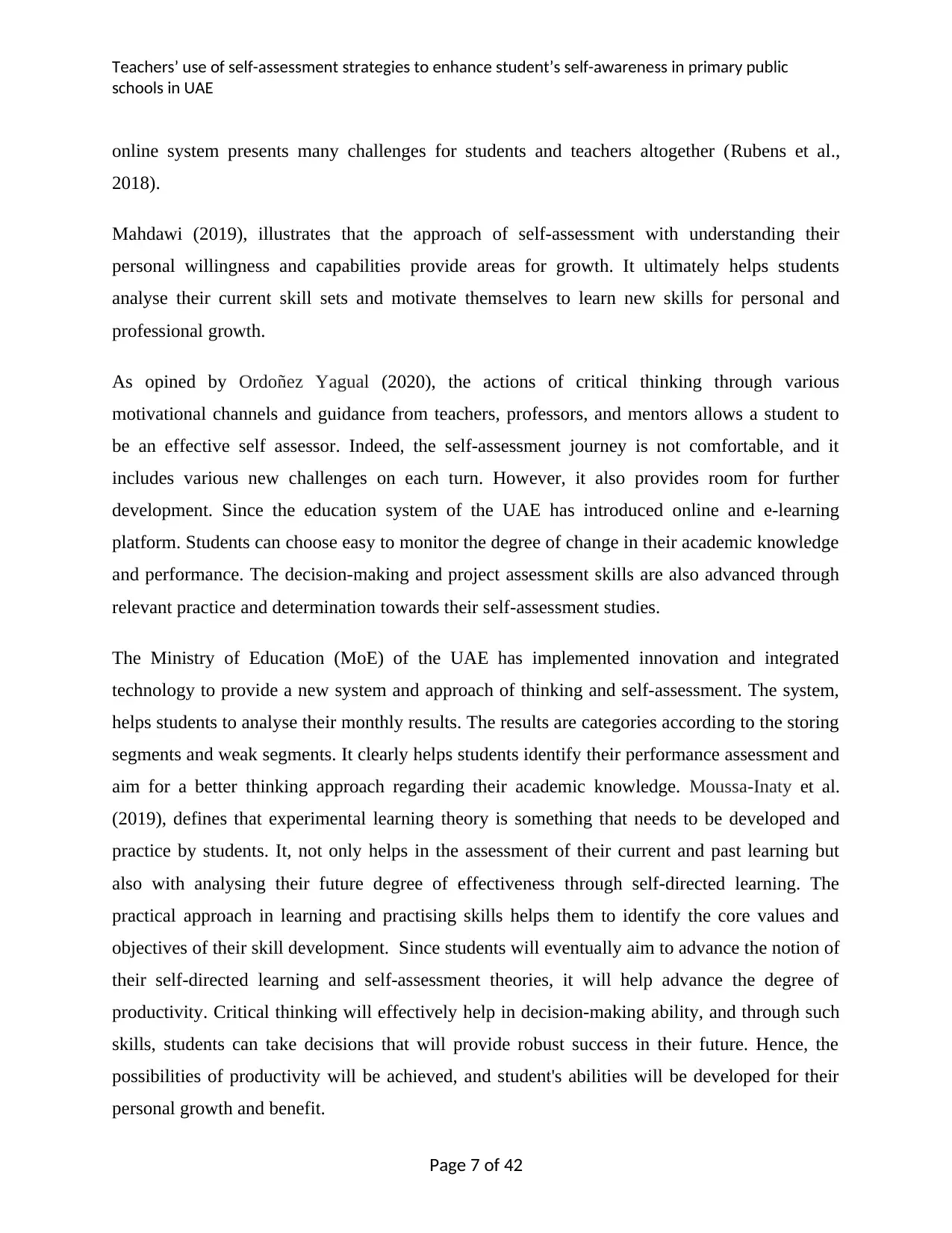
Teachers’ use of self-assessment strategies to enhance student’s self-awareness in primary public
schools in UAE
online system presents many challenges for students and teachers altogether (Rubens et al.,
2018).
Mahdawi (2019), illustrates that the approach of self-assessment with understanding their
personal willingness and capabilities provide areas for growth. It ultimately helps students
analyse their current skill sets and motivate themselves to learn new skills for personal and
professional growth.
As opined by Ordoñez Yagual (2020), the actions of critical thinking through various
motivational channels and guidance from teachers, professors, and mentors allows a student to
be an effective self assessor. Indeed, the self-assessment journey is not comfortable, and it
includes various new challenges on each turn. However, it also provides room for further
development. Since the education system of the UAE has introduced online and e-learning
platform. Students can choose easy to monitor the degree of change in their academic knowledge
and performance. The decision-making and project assessment skills are also advanced through
relevant practice and determination towards their self-assessment studies.
The Ministry of Education (MoE) of the UAE has implemented innovation and integrated
technology to provide a new system and approach of thinking and self-assessment. The system,
helps students to analyse their monthly results. The results are categories according to the storing
segments and weak segments. It clearly helps students identify their performance assessment and
aim for a better thinking approach regarding their academic knowledge. Moussa-Inaty et al.
(2019), defines that experimental learning theory is something that needs to be developed and
practice by students. It, not only helps in the assessment of their current and past learning but
also with analysing their future degree of effectiveness through self-directed learning. The
practical approach in learning and practising skills helps them to identify the core values and
objectives of their skill development. Since students will eventually aim to advance the notion of
their self-directed learning and self-assessment theories, it will help advance the degree of
productivity. Critical thinking will effectively help in decision-making ability, and through such
skills, students can take decisions that will provide robust success in their future. Hence, the
possibilities of productivity will be achieved, and student's abilities will be developed for their
personal growth and benefit.
Page 7 of 42
schools in UAE
online system presents many challenges for students and teachers altogether (Rubens et al.,
2018).
Mahdawi (2019), illustrates that the approach of self-assessment with understanding their
personal willingness and capabilities provide areas for growth. It ultimately helps students
analyse their current skill sets and motivate themselves to learn new skills for personal and
professional growth.
As opined by Ordoñez Yagual (2020), the actions of critical thinking through various
motivational channels and guidance from teachers, professors, and mentors allows a student to
be an effective self assessor. Indeed, the self-assessment journey is not comfortable, and it
includes various new challenges on each turn. However, it also provides room for further
development. Since the education system of the UAE has introduced online and e-learning
platform. Students can choose easy to monitor the degree of change in their academic knowledge
and performance. The decision-making and project assessment skills are also advanced through
relevant practice and determination towards their self-assessment studies.
The Ministry of Education (MoE) of the UAE has implemented innovation and integrated
technology to provide a new system and approach of thinking and self-assessment. The system,
helps students to analyse their monthly results. The results are categories according to the storing
segments and weak segments. It clearly helps students identify their performance assessment and
aim for a better thinking approach regarding their academic knowledge. Moussa-Inaty et al.
(2019), defines that experimental learning theory is something that needs to be developed and
practice by students. It, not only helps in the assessment of their current and past learning but
also with analysing their future degree of effectiveness through self-directed learning. The
practical approach in learning and practising skills helps them to identify the core values and
objectives of their skill development. Since students will eventually aim to advance the notion of
their self-directed learning and self-assessment theories, it will help advance the degree of
productivity. Critical thinking will effectively help in decision-making ability, and through such
skills, students can take decisions that will provide robust success in their future. Hence, the
possibilities of productivity will be achieved, and student's abilities will be developed for their
personal growth and benefit.
Page 7 of 42
Paraphrase This Document
Need a fresh take? Get an instant paraphrase of this document with our AI Paraphraser
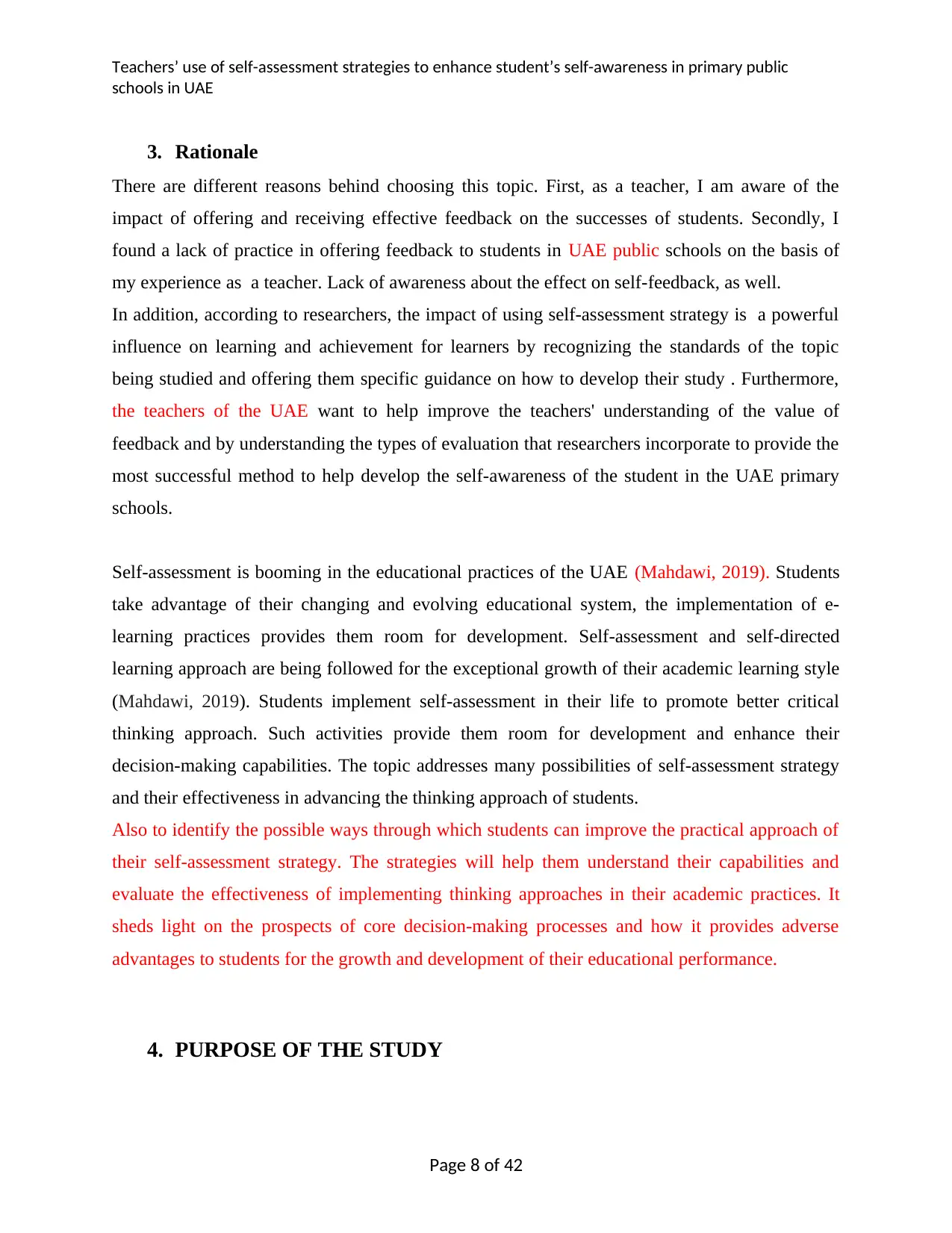
Teachers’ use of self-assessment strategies to enhance student’s self-awareness in primary public
schools in UAE
3. Rationale
There are different reasons behind choosing this topic. First, as a teacher, I am aware of the
impact of offering and receiving effective feedback on the successes of students. Secondly, I
found a lack of practice in offering feedback to students in UAE public schools on the basis of
my experience as a teacher. Lack of awareness about the effect on self-feedback, as well.
In addition, according to researchers, the impact of using self-assessment strategy is a powerful
influence on learning and achievement for learners by recognizing the standards of the topic
being studied and offering them specific guidance on how to develop their study . Furthermore,
the teachers of the UAE want to help improve the teachers' understanding of the value of
feedback and by understanding the types of evaluation that researchers incorporate to provide the
most successful method to help develop the self-awareness of the student in the UAE primary
schools.
Self-assessment is booming in the educational practices of the UAE (Mahdawi, 2019). Students
take advantage of their changing and evolving educational system, the implementation of e-
learning practices provides them room for development. Self-assessment and self-directed
learning approach are being followed for the exceptional growth of their academic learning style
(Mahdawi, 2019). Students implement self-assessment in their life to promote better critical
thinking approach. Such activities provide them room for development and enhance their
decision-making capabilities. The topic addresses many possibilities of self-assessment strategy
and their effectiveness in advancing the thinking approach of students.
Also to identify the possible ways through which students can improve the practical approach of
their self-assessment strategy. The strategies will help them understand their capabilities and
evaluate the effectiveness of implementing thinking approaches in their academic practices. It
sheds light on the prospects of core decision-making processes and how it provides adverse
advantages to students for the growth and development of their educational performance.
4. PURPOSE OF THE STUDY
Page 8 of 42
schools in UAE
3. Rationale
There are different reasons behind choosing this topic. First, as a teacher, I am aware of the
impact of offering and receiving effective feedback on the successes of students. Secondly, I
found a lack of practice in offering feedback to students in UAE public schools on the basis of
my experience as a teacher. Lack of awareness about the effect on self-feedback, as well.
In addition, according to researchers, the impact of using self-assessment strategy is a powerful
influence on learning and achievement for learners by recognizing the standards of the topic
being studied and offering them specific guidance on how to develop their study . Furthermore,
the teachers of the UAE want to help improve the teachers' understanding of the value of
feedback and by understanding the types of evaluation that researchers incorporate to provide the
most successful method to help develop the self-awareness of the student in the UAE primary
schools.
Self-assessment is booming in the educational practices of the UAE (Mahdawi, 2019). Students
take advantage of their changing and evolving educational system, the implementation of e-
learning practices provides them room for development. Self-assessment and self-directed
learning approach are being followed for the exceptional growth of their academic learning style
(Mahdawi, 2019). Students implement self-assessment in their life to promote better critical
thinking approach. Such activities provide them room for development and enhance their
decision-making capabilities. The topic addresses many possibilities of self-assessment strategy
and their effectiveness in advancing the thinking approach of students.
Also to identify the possible ways through which students can improve the practical approach of
their self-assessment strategy. The strategies will help them understand their capabilities and
evaluate the effectiveness of implementing thinking approaches in their academic practices. It
sheds light on the prospects of core decision-making processes and how it provides adverse
advantages to students for the growth and development of their educational performance.
4. PURPOSE OF THE STUDY
Page 8 of 42
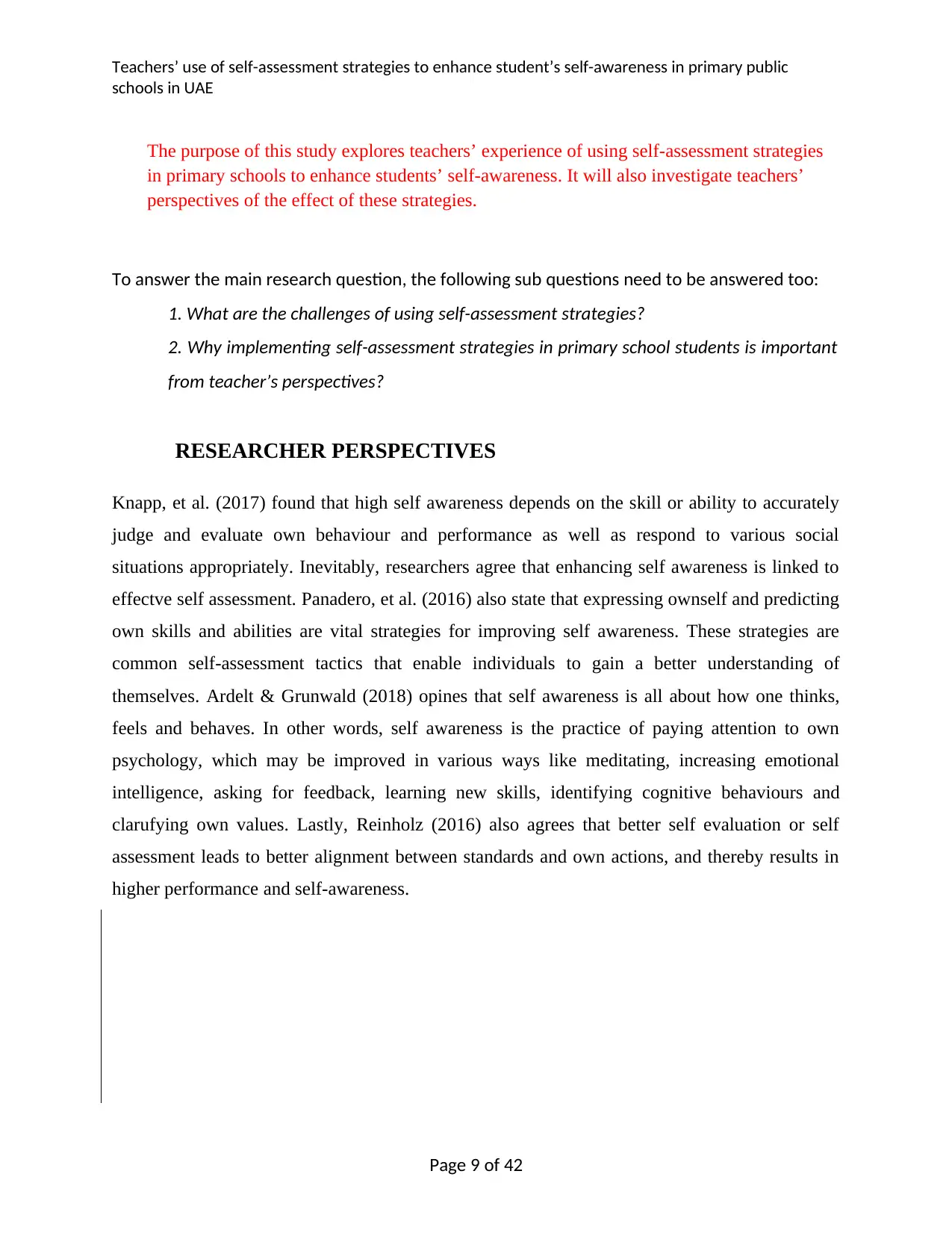
Teachers’ use of self-assessment strategies to enhance student’s self-awareness in primary public
schools in UAE
The purpose of this study explores teachers’ experience of using self-assessment strategies
in primary schools to enhance students’ self-awareness. It will also investigate teachers’
perspectives of the effect of these strategies.
To answer the main research question, the following sub questions need to be answered too:
1. What are the challenges of using self-assessment strategies?
2. Why implementing self-assessment strategies in primary school students is important
from teacher’s perspectives?
RESEARCHER PERSPECTIVES
Knapp, et al. (2017) found that high self awareness depends on the skill or ability to accurately
judge and evaluate own behaviour and performance as well as respond to various social
situations appropriately. Inevitably, researchers agree that enhancing self awareness is linked to
effectve self assessment. Panadero, et al. (2016) also state that expressing ownself and predicting
own skills and abilities are vital strategies for improving self awareness. These strategies are
common self-assessment tactics that enable individuals to gain a better understanding of
themselves. Ardelt & Grunwald (2018) opines that self awareness is all about how one thinks,
feels and behaves. In other words, self awareness is the practice of paying attention to own
psychology, which may be improved in various ways like meditating, increasing emotional
intelligence, asking for feedback, learning new skills, identifying cognitive behaviours and
clarufying own values. Lastly, Reinholz (2016) also agrees that better self evaluation or self
assessment leads to better alignment between standards and own actions, and thereby results in
higher performance and self-awareness.
Page 9 of 42
schools in UAE
The purpose of this study explores teachers’ experience of using self-assessment strategies
in primary schools to enhance students’ self-awareness. It will also investigate teachers’
perspectives of the effect of these strategies.
To answer the main research question, the following sub questions need to be answered too:
1. What are the challenges of using self-assessment strategies?
2. Why implementing self-assessment strategies in primary school students is important
from teacher’s perspectives?
RESEARCHER PERSPECTIVES
Knapp, et al. (2017) found that high self awareness depends on the skill or ability to accurately
judge and evaluate own behaviour and performance as well as respond to various social
situations appropriately. Inevitably, researchers agree that enhancing self awareness is linked to
effectve self assessment. Panadero, et al. (2016) also state that expressing ownself and predicting
own skills and abilities are vital strategies for improving self awareness. These strategies are
common self-assessment tactics that enable individuals to gain a better understanding of
themselves. Ardelt & Grunwald (2018) opines that self awareness is all about how one thinks,
feels and behaves. In other words, self awareness is the practice of paying attention to own
psychology, which may be improved in various ways like meditating, increasing emotional
intelligence, asking for feedback, learning new skills, identifying cognitive behaviours and
clarufying own values. Lastly, Reinholz (2016) also agrees that better self evaluation or self
assessment leads to better alignment between standards and own actions, and thereby results in
higher performance and self-awareness.
Page 9 of 42
⊘ This is a preview!⊘
Do you want full access?
Subscribe today to unlock all pages.

Trusted by 1+ million students worldwide
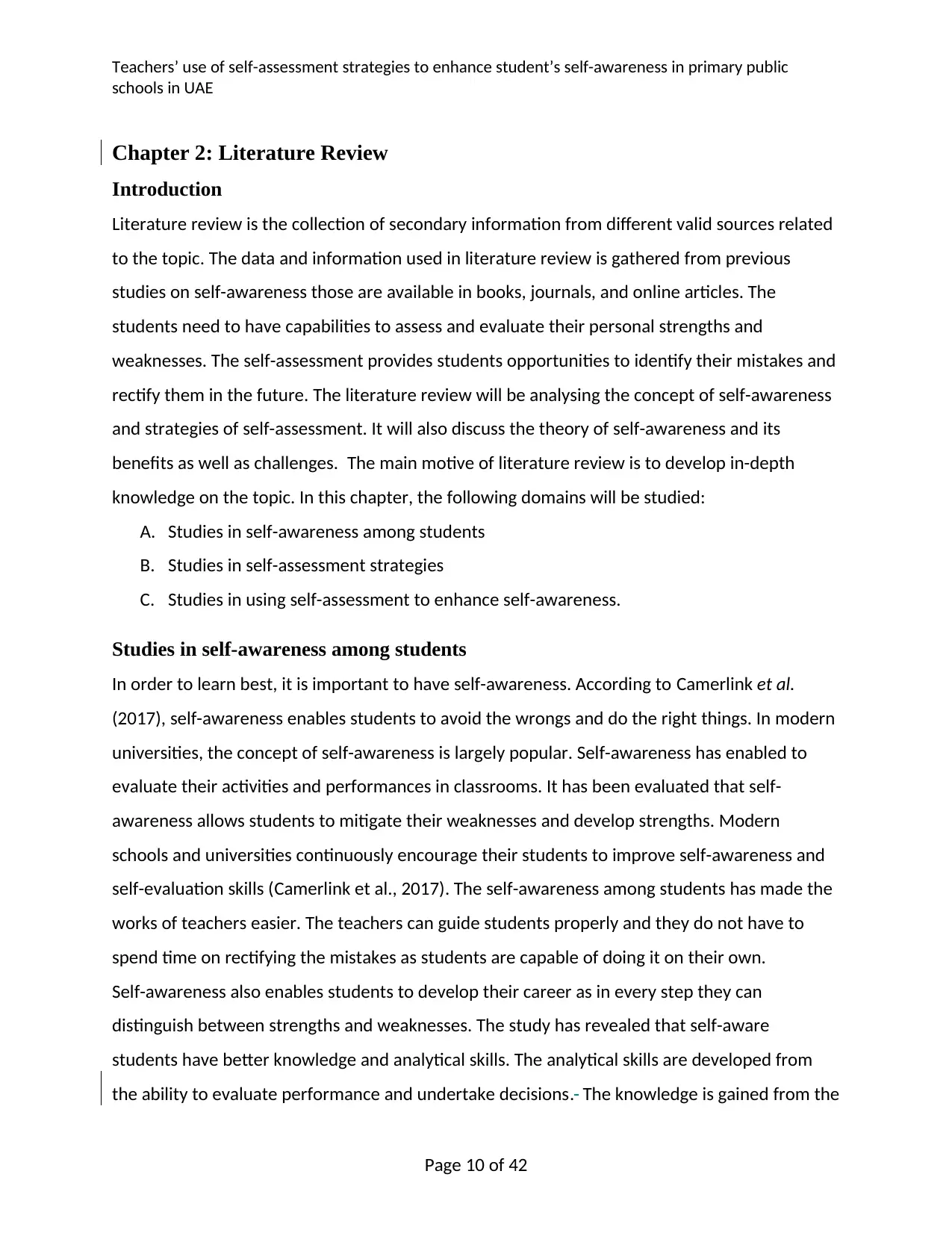
Teachers’ use of self-assessment strategies to enhance student’s self-awareness in primary public
schools in UAE
Chapter 2: Literature Review
Introduction
Literature review is the collection of secondary information from different valid sources related
to the topic. The data and information used in literature review is gathered from previous
studies on self-awareness those are available in books, journals, and online articles. The
students need to have capabilities to assess and evaluate their personal strengths and
weaknesses. The self-assessment provides students opportunities to identify their mistakes and
rectify them in the future. The literature review will be analysing the concept of self-awareness
and strategies of self-assessment. It will also discuss the theory of self-awareness and its
benefits as well as challenges. The main motive of literature review is to develop in-depth
knowledge on the topic. In this chapter, the following domains will be studied:
A. Studies in self-awareness among students
B. Studies in self-assessment strategies
C. Studies in using self-assessment to enhance self-awareness.
Studies in self-awareness among students
In order to learn best, it is important to have self-awareness. According to Camerlink et al.
(2017), self-awareness enables students to avoid the wrongs and do the right things. In modern
universities, the concept of self-awareness is largely popular. Self-awareness has enabled to
evaluate their activities and performances in classrooms. It has been evaluated that self-
awareness allows students to mitigate their weaknesses and develop strengths. Modern
schools and universities continuously encourage their students to improve self-awareness and
self-evaluation skills (Camerlink et al., 2017). The self-awareness among students has made the
works of teachers easier. The teachers can guide students properly and they do not have to
spend time on rectifying the mistakes as students are capable of doing it on their own.
Self-awareness also enables students to develop their career as in every step they can
distinguish between strengths and weaknesses. The study has revealed that self-aware
students have better knowledge and analytical skills. The analytical skills are developed from
the ability to evaluate performance and undertake decisions. The knowledge is gained from the
Page 10 of 42
schools in UAE
Chapter 2: Literature Review
Introduction
Literature review is the collection of secondary information from different valid sources related
to the topic. The data and information used in literature review is gathered from previous
studies on self-awareness those are available in books, journals, and online articles. The
students need to have capabilities to assess and evaluate their personal strengths and
weaknesses. The self-assessment provides students opportunities to identify their mistakes and
rectify them in the future. The literature review will be analysing the concept of self-awareness
and strategies of self-assessment. It will also discuss the theory of self-awareness and its
benefits as well as challenges. The main motive of literature review is to develop in-depth
knowledge on the topic. In this chapter, the following domains will be studied:
A. Studies in self-awareness among students
B. Studies in self-assessment strategies
C. Studies in using self-assessment to enhance self-awareness.
Studies in self-awareness among students
In order to learn best, it is important to have self-awareness. According to Camerlink et al.
(2017), self-awareness enables students to avoid the wrongs and do the right things. In modern
universities, the concept of self-awareness is largely popular. Self-awareness has enabled to
evaluate their activities and performances in classrooms. It has been evaluated that self-
awareness allows students to mitigate their weaknesses and develop strengths. Modern
schools and universities continuously encourage their students to improve self-awareness and
self-evaluation skills (Camerlink et al., 2017). The self-awareness among students has made the
works of teachers easier. The teachers can guide students properly and they do not have to
spend time on rectifying the mistakes as students are capable of doing it on their own.
Self-awareness also enables students to develop their career as in every step they can
distinguish between strengths and weaknesses. The study has revealed that self-aware
students have better knowledge and analytical skills. The analytical skills are developed from
the ability to evaluate performance and undertake decisions. The knowledge is gained from the
Page 10 of 42
Paraphrase This Document
Need a fresh take? Get an instant paraphrase of this document with our AI Paraphraser
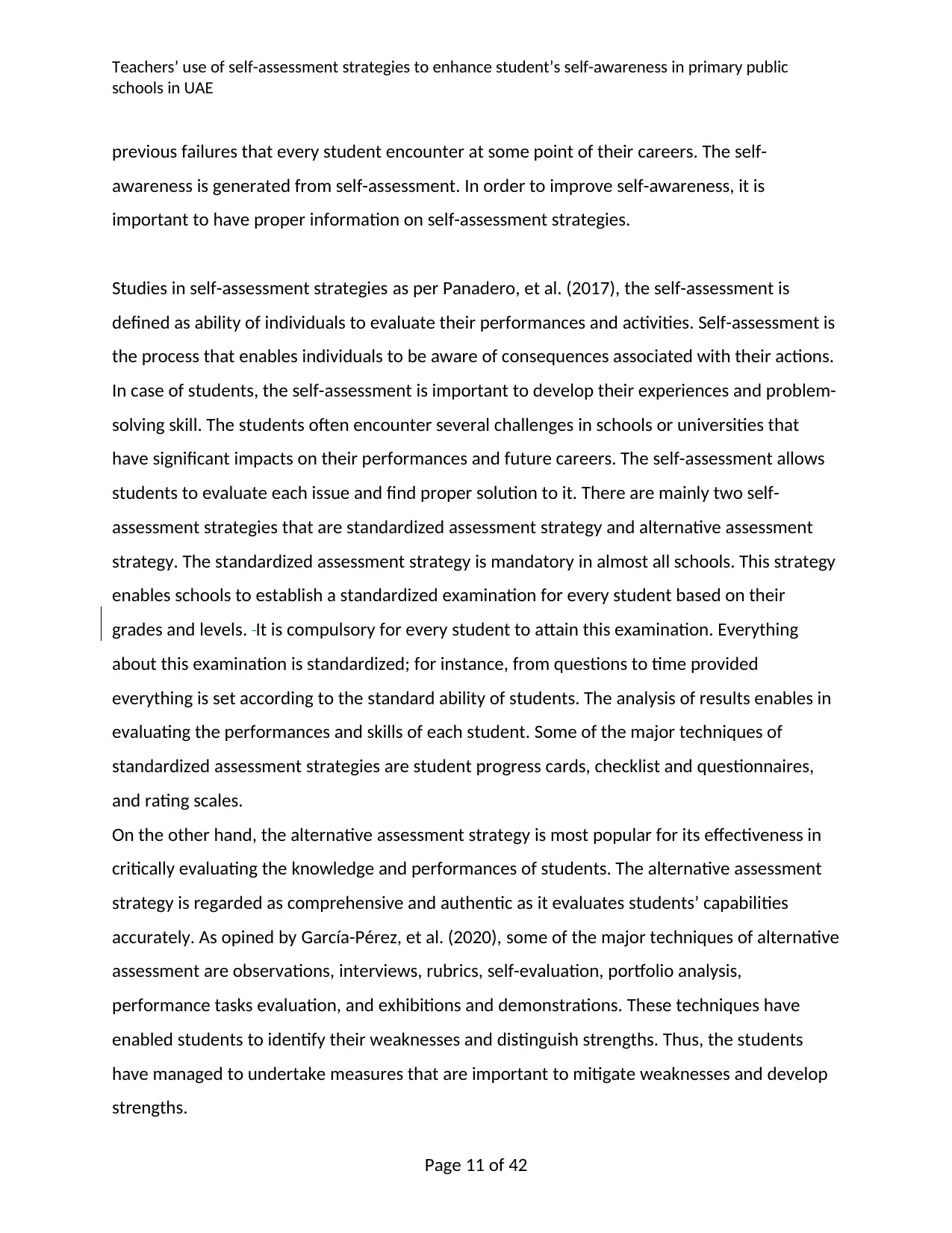
Teachers’ use of self-assessment strategies to enhance student’s self-awareness in primary public
schools in UAE
previous failures that every student encounter at some point of their careers. The self-
awareness is generated from self-assessment. In order to improve self-awareness, it is
important to have proper information on self-assessment strategies.
Studies in self-assessment strategies as per Panadero, et al. (2017), the self-assessment is
defined as ability of individuals to evaluate their performances and activities. Self-assessment is
the process that enables individuals to be aware of consequences associated with their actions.
In case of students, the self-assessment is important to develop their experiences and problem-
solving skill. The students often encounter several challenges in schools or universities that
have significant impacts on their performances and future careers. The self-assessment allows
students to evaluate each issue and find proper solution to it. There are mainly two self-
assessment strategies that are standardized assessment strategy and alternative assessment
strategy. The standardized assessment strategy is mandatory in almost all schools. This strategy
enables schools to establish a standardized examination for every student based on their
grades and levels. It is compulsory for every student to attain this examination. Everything
about this examination is standardized; for instance, from questions to time provided
everything is set according to the standard ability of students. The analysis of results enables in
evaluating the performances and skills of each student. Some of the major techniques of
standardized assessment strategies are student progress cards, checklist and questionnaires,
and rating scales.
On the other hand, the alternative assessment strategy is most popular for its effectiveness in
critically evaluating the knowledge and performances of students. The alternative assessment
strategy is regarded as comprehensive and authentic as it evaluates students’ capabilities
accurately. As opined by García-Pérez, et al. (2020), some of the major techniques of alternative
assessment are observations, interviews, rubrics, self-evaluation, portfolio analysis,
performance tasks evaluation, and exhibitions and demonstrations. These techniques have
enabled students to identify their weaknesses and distinguish strengths. Thus, the students
have managed to undertake measures that are important to mitigate weaknesses and develop
strengths.
Page 11 of 42
schools in UAE
previous failures that every student encounter at some point of their careers. The self-
awareness is generated from self-assessment. In order to improve self-awareness, it is
important to have proper information on self-assessment strategies.
Studies in self-assessment strategies as per Panadero, et al. (2017), the self-assessment is
defined as ability of individuals to evaluate their performances and activities. Self-assessment is
the process that enables individuals to be aware of consequences associated with their actions.
In case of students, the self-assessment is important to develop their experiences and problem-
solving skill. The students often encounter several challenges in schools or universities that
have significant impacts on their performances and future careers. The self-assessment allows
students to evaluate each issue and find proper solution to it. There are mainly two self-
assessment strategies that are standardized assessment strategy and alternative assessment
strategy. The standardized assessment strategy is mandatory in almost all schools. This strategy
enables schools to establish a standardized examination for every student based on their
grades and levels. It is compulsory for every student to attain this examination. Everything
about this examination is standardized; for instance, from questions to time provided
everything is set according to the standard ability of students. The analysis of results enables in
evaluating the performances and skills of each student. Some of the major techniques of
standardized assessment strategies are student progress cards, checklist and questionnaires,
and rating scales.
On the other hand, the alternative assessment strategy is most popular for its effectiveness in
critically evaluating the knowledge and performances of students. The alternative assessment
strategy is regarded as comprehensive and authentic as it evaluates students’ capabilities
accurately. As opined by García-Pérez, et al. (2020), some of the major techniques of alternative
assessment are observations, interviews, rubrics, self-evaluation, portfolio analysis,
performance tasks evaluation, and exhibitions and demonstrations. These techniques have
enabled students to identify their weaknesses and distinguish strengths. Thus, the students
have managed to undertake measures that are important to mitigate weaknesses and develop
strengths.
Page 11 of 42
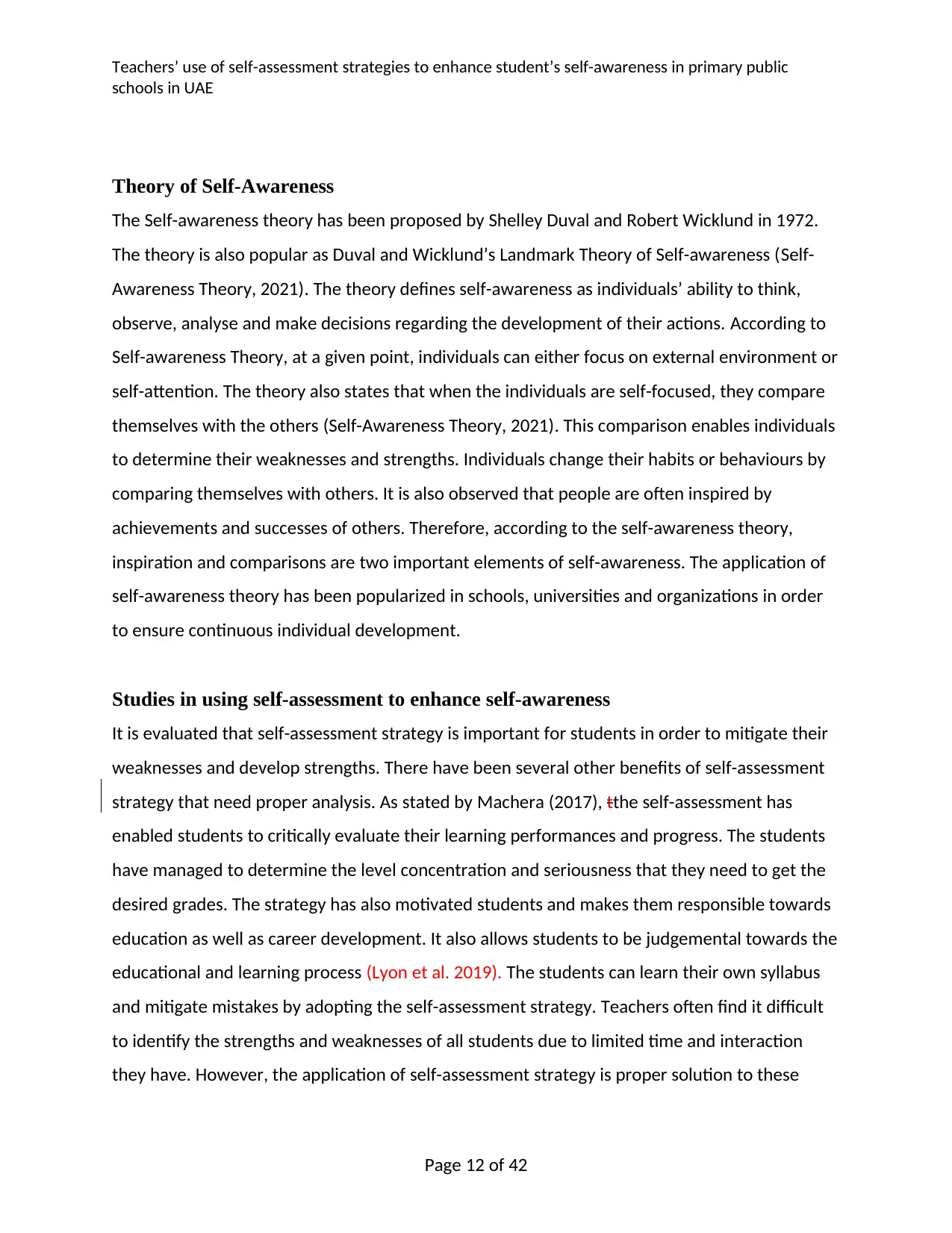
Teachers’ use of self-assessment strategies to enhance student’s self-awareness in primary public
schools in UAE
Theory of Self-Awareness
The Self-awareness theory has been proposed by Shelley Duval and Robert Wicklund in 1972.
The theory is also popular as Duval and Wicklund’s Landmark Theory of Self-awareness (Self-
Awareness Theory, 2021). The theory defines self-awareness as individuals’ ability to think,
observe, analyse and make decisions regarding the development of their actions. According to
Self-awareness Theory, at a given point, individuals can either focus on external environment or
self-attention. The theory also states that when the individuals are self-focused, they compare
themselves with the others (Self-Awareness Theory, 2021). This comparison enables individuals
to determine their weaknesses and strengths. Individuals change their habits or behaviours by
comparing themselves with others. It is also observed that people are often inspired by
achievements and successes of others. Therefore, according to the self-awareness theory,
inspiration and comparisons are two important elements of self-awareness. The application of
self-awareness theory has been popularized in schools, universities and organizations in order
to ensure continuous individual development.
Studies in using self-assessment to enhance self-awareness
It is evaluated that self-assessment strategy is important for students in order to mitigate their
weaknesses and develop strengths. There have been several other benefits of self-assessment
strategy that need proper analysis. As stated by Machera (2017), tthe self-assessment has
enabled students to critically evaluate their learning performances and progress. The students
have managed to determine the level concentration and seriousness that they need to get the
desired grades. The strategy has also motivated students and makes them responsible towards
education as well as career development. It also allows students to be judgemental towards the
educational and learning process (Lyon et al. 2019). The students can learn their own syllabus
and mitigate mistakes by adopting the self-assessment strategy. Teachers often find it difficult
to identify the strengths and weaknesses of all students due to limited time and interaction
they have. However, the application of self-assessment strategy is proper solution to these
Page 12 of 42
schools in UAE
Theory of Self-Awareness
The Self-awareness theory has been proposed by Shelley Duval and Robert Wicklund in 1972.
The theory is also popular as Duval and Wicklund’s Landmark Theory of Self-awareness (Self-
Awareness Theory, 2021). The theory defines self-awareness as individuals’ ability to think,
observe, analyse and make decisions regarding the development of their actions. According to
Self-awareness Theory, at a given point, individuals can either focus on external environment or
self-attention. The theory also states that when the individuals are self-focused, they compare
themselves with the others (Self-Awareness Theory, 2021). This comparison enables individuals
to determine their weaknesses and strengths. Individuals change their habits or behaviours by
comparing themselves with others. It is also observed that people are often inspired by
achievements and successes of others. Therefore, according to the self-awareness theory,
inspiration and comparisons are two important elements of self-awareness. The application of
self-awareness theory has been popularized in schools, universities and organizations in order
to ensure continuous individual development.
Studies in using self-assessment to enhance self-awareness
It is evaluated that self-assessment strategy is important for students in order to mitigate their
weaknesses and develop strengths. There have been several other benefits of self-assessment
strategy that need proper analysis. As stated by Machera (2017), tthe self-assessment has
enabled students to critically evaluate their learning performances and progress. The students
have managed to determine the level concentration and seriousness that they need to get the
desired grades. The strategy has also motivated students and makes them responsible towards
education as well as career development. It also allows students to be judgemental towards the
educational and learning process (Lyon et al. 2019). The students can learn their own syllabus
and mitigate mistakes by adopting the self-assessment strategy. Teachers often find it difficult
to identify the strengths and weaknesses of all students due to limited time and interaction
they have. However, the application of self-assessment strategy is proper solution to these
Page 12 of 42
⊘ This is a preview!⊘
Do you want full access?
Subscribe today to unlock all pages.

Trusted by 1+ million students worldwide
1 out of 42
Related Documents
Your All-in-One AI-Powered Toolkit for Academic Success.
+13062052269
info@desklib.com
Available 24*7 on WhatsApp / Email
![[object Object]](/_next/static/media/star-bottom.7253800d.svg)
Unlock your academic potential
Copyright © 2020–2026 A2Z Services. All Rights Reserved. Developed and managed by ZUCOL.





